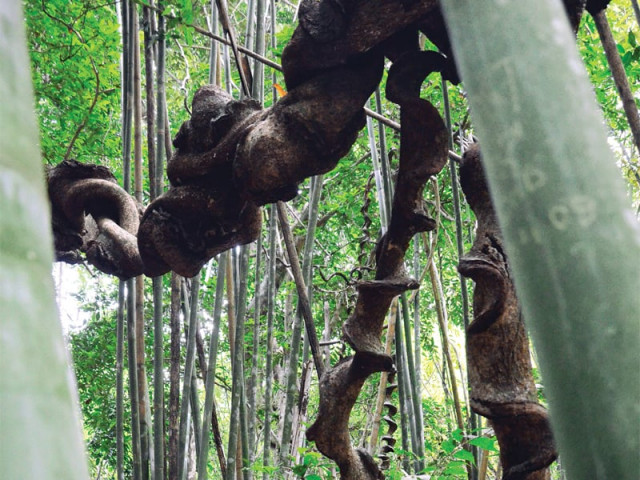Ecotourism: Tourism evolution
Writer explores delights this tourist hotspot can offer a visitor who likes to keep things ‘green'.

Ecotourism: Tourism evolution
During the 1980s, when on survival training in the wildernesses of Pakistan, Nepal and Kenya, conducted by the Adventure Foundation of Pakistan, I defined it as: “Take nothing but pictures, leave nothing behind but footprints.”
In the mid-nineties, due to an upsurge in the awareness of the negative effects of mass tourism on previously sheltered local communities, I added to the definition: “… and ‘adding’ value to the locals as compensation for breaching their privacy and stealing a look into their cultures and lifestyle.”
Now it has been redefined as “visiting natural areas with the objectives of learning, studying or participating in activities that do not negatively affect the environment; whilst protecting and empowering the local community socially and economically."
Holding true to my current definition, I embarked on my recent journey to the east coast of Thailand, a place thriving on ecotourism. My destination was the Faasai Eco Resort — which would be the base of my eco travels in the serene location of Kung Wiman Peninsula.
Welcoming me upon my arrival was the owner of the resort, who volunteered to take me on a tour of the resort. We walked through a veritable jungle, the backyard of the resort; a result of the owner’s careful planning.
The place appealed to me so much that after a quick nap I was back in the forest exploring the abundant variety of fruit trees and its spice garden, and I also managed to stumble upon a mineral water lagoon. Surrounded by the wilderness I could hear the gushing stream which flows with plenty of fish; a fact that also makes it a haven for a large variety of birds. I couldn’t help but feel a sense of peace — I felt at one with Mother Nature, as clichéd as that may sound.
While surveying the area we also visited a neighbouring orchard, where trees were laden with longan (dragon eye fruit), jack fruit, pineapple and durian. Chanthburi is the renowned capital of durian, the king of fruits in South East Asia which is also well known for its foul smell, quite like that of gym socks after you have sweated it out, unfortunately.
The resort was filled with eco-friendly surprises on the inside, too. Instead of taking a dip in a regular chlorinated pool, you shall find yourself wading in a mineral-rich pool of water fed by an underground spring.
The resort also boasts of a leisure forest trail which takes you over a hill to a secluded beach. On the sublime beach with a rocky shoreline, away from the hustle and bustle I had left far behind, I felt truly blessed.
Overcome by a feeling of fulfillment, a thought crossed my mind: “Would this place ever be the same if more and more people started visiting it and interfering with its unspoiled beauty?”
Awakening me the next morning was the sound of nature — the chirping of birds and the pitter-patter of a drizzle. I hit the road once again sustained by a wholesome meal of cereal and coconut juice. We drove a few kilometres from the Resort to Hua Laem Fishing Village, located at the foothills of the Cardamom Mountains, to observe the local fishing community. This was an opportunity to experience a simple lifestyle where people sustain themselves from the natural offerings of the sea.
Confirming my worst fears, I was informed that owing to the increasing number of visitors the fishermen had started supplementing their insufficient income by offering tourists accommodation at their homes. Some of the locals had also attempted to improve their sanitary facilities to cater to the tourists — a deathblow to the rural lifestyle. Disturbed by this trend that altered the natural order of things, I turned and distracted myself with the beautiful view of the nearby White Water Lake.
For my third and final day at the resort, on a quest to extract the ultimate from my eco-travel experience, I travelled deeper into the forest. I start my expedition by driving for an hour and a half to the Khao Chamao National Park. The museum at the entrance has an interesting display of forest ecology and wildlife within the park area — a great way of getting acquainted with the wildlife within the park.
The Park is divided by its two primary features; the main topography which includes the Khao Chamao forests and the Yad Khao Pan Tee, standing at a daunting height of 1024 metres. The fertile, moist, evergreen forest features many natural attractions; a large variety of trees, natives of the area, waterfalls and caves. The area along the Prasae River is a sanctuary for wildlife, home to all sorts of mammals, amphibians and reptiles. If you’re lucky, you can catch glimpses of elephants, crown gibbons, sea cows, barking deer and a wide variety of bird species.
This is the true feel of eco-tourism, the passion for which brought me to this place. It is an opportunity to be in sync with nature; to admire its beauty without tainting it; to appreciate its offerings without spoiling it and to cater to the survival of its inhabitants without contaminating it.
Today, however, this new buzzword has attracted many people; some wanting to contribute to ‘green’ travel and some wanting to make a quick buck off it. To ensure that you are in for a good eco-travel experience always be sure to distinguish ‘green’ tourist traps from the genuinely eco-friendly ones. Thankfully, there are still some people out there who are genuinely concerned for the future of healthy tourism, tourism that depends on sustainability and preservation.
Published in The Express Tribune, Sunday Magazine, July 24th, 2011.



















COMMENTS
Comments are moderated and generally will be posted if they are on-topic and not abusive.
For more information, please see our Comments FAQ